- Promoting Well-Being in Children and Adolescents: A Holistic Guide to Mindfulness Strategies and Effects March 12, 2024
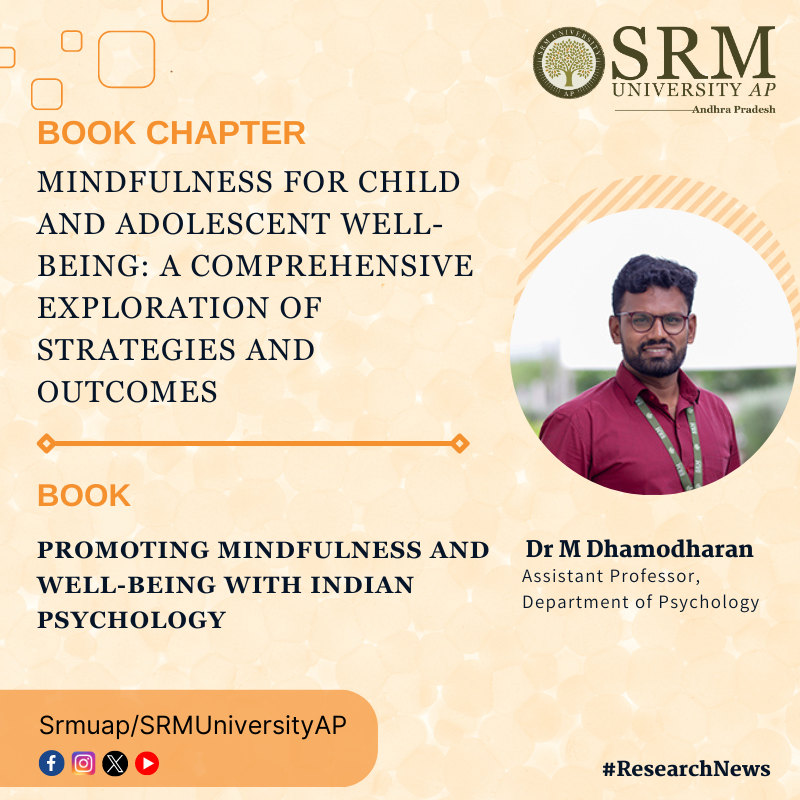
Mindfulness has emerged as a pivotal aspect in the domain of mental health, especially in the context of children and adolescents’ well-being. It refers to an inherent ability to be fully present in the moment, enabling an individual to gain an acute sense of awareness without any biases. Such a state of mindfulness empowers individuals to navigate the ups and downs of life with clarity and composure. Dr M Dhamodharan, an Assistant Professor in the Department of Psychology, has published a book chapter titled “Mindfulness for Child and Adolescent Well-Being: A Comprehensive Exploration of Strategies and Outcomes,” where he has comprehensively explored the intricacies of mindfulness and its impact on children and adolescents.
Here’s an abstract of the chapter published in the book, “Promoting Mindfulness and Well-Being with Indian Psychology.”
About the book chapter
The chapter examines the significant impact of mindfulness on children and adolescents. Mindfulness is the mental state defined by greater concentration, consciousness, and focus on the here and now, free from judgment. This chapter starts with the theoretical background of mindfulness and the current developments of mindfulness related to children’s and adolescents’ wellbeing. There are three main domains focused on mindfulness. Begin with emotional domains—that explains how mindfulness helps to regulate emotions. Secondly, cognitive domains explain how mindfulness practices help cognitive development and academic performance in educational settings. Thirdly, social and interpersonal domains explain the uses of mindfulness to improve social skills and interpersonal relationships with peer groups, family, and society. The chapter concludes with the role of parental and educational institutions in promoting mindfulness among children and adolescents to create a positive impact on their lives.
Dr Dhamodharan’s book chapter is targeted at Educators, parents, counsellors, and mental health specialists who stand to gain invaluable insights from the exploration of mindfulness within these pages.
Continue reading → - Dr Dhamodharan Invited for Workshop on Youth Leadership February 16, 2024
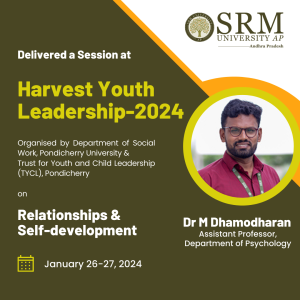 Dr M Dhamodharan, Assistant Professor in the Department of Psychology, was invited as a resource person to deliver a session on “Relationship and Self Development “from January 26-27, 2024, at the Two Days workshop on “Harvesting Youth Leadership-2024.”The workshop was organised by the Department of Social Work at Pondicherry Central University in collaboration with the Trust for Youth and Child Leadership (TYCL), Pondicherry.
Dr M Dhamodharan, Assistant Professor in the Department of Psychology, was invited as a resource person to deliver a session on “Relationship and Self Development “from January 26-27, 2024, at the Two Days workshop on “Harvesting Youth Leadership-2024.”The workshop was organised by the Department of Social Work at Pondicherry Central University in collaboration with the Trust for Youth and Child Leadership (TYCL), Pondicherry.Dr Dhamodharan’s expertise and insights on the topic added value to the workshop, which aimed to empower young individuals and cultivate leadership skills among the youth. The session provided a platform for participants to delve into the dynamics of relationships and personal growth, essential aspects for nurturing effective leadership qualities.
His contribution towards the event underscored the importance of understanding the link between relationships and self-development in the context of youth leadership.
Abstract
Relationship is a continuing and often committed association between two or more people, as in a family, friendship, marriage, partnership, or other interpersonal links in which the participants influence each other’s thoughts, feelings, and actions (APA,2020).
The connections we set up, the several types of love we meet, and the effects these interactions have on our personal development all have a significant impact on how we live as people. Understanding the many kinds of relationships that exist is the first step in any analysis of relationships.Every sort of relationship, whether it be sexual or platonic, professional or familial, has its own dynamics, obstacles, and expectations. In the context of human relationships, love manifests as a complex and profound energy. Love affects the core of who we are and transcends cultural barriers in all its manifestations. Numerous love typologies have been proved by academics and psychologists to classify and understand these types. Love has many sides, ranging from the Greek concepts of Agape, Eros, and Philia to contemporary psychiatric theories. This investigation looks at the subtle differences between various kinds of love, emphasising the behavioural, cognitive, and emotional aspects of each.
A foundational work in the field of psychology, Sternberg’s Triangular Theory of Love is at the core of understanding love. According to this theory, love can be viewed as a triangle made up of three essential elements: commitment, passion, and intimacy. It explores the significance of each ingredient and how they interact to shape the different manifestations of love through a thorough investigation of Sternberg’s theory. The talk explains the practical applications, providing a window into how the theory may be used to understand and negotiate the intricacies of real-world interactions.
Furthermore, a comprehensive knowledge of the human experience requires the inclusion of self-development in the conversation about love and relationships. In all their manifestations, relationships function as mirrors that reflect our advantages, disadvantages, and potential growth areas. The reciprocal effects of relationships, love kinds, and self-development are particularly important in human life. Also explains. how people change because of their relationships, moulding and honing their identities to fit the demands of romantic relationships and close relationships.
Finally, this session might give light on the complex interactions that exist between self-development, Sternberg’s Triangular Theory, love categories, and relationship types. Participants may understand more about the complex interplay between love and personal development as well as the enormous impact that connections have on forming our identities by exploring these interconnected domains. This talk might give insightful guidance for the participants to navigating the intricate web of interpersonal interactions, supplying a road map for cultivating meaningful connections and promoting comprehensive self-development.
Continue reading → - A Research On Examining Stress Among Adolescents December 27, 2023
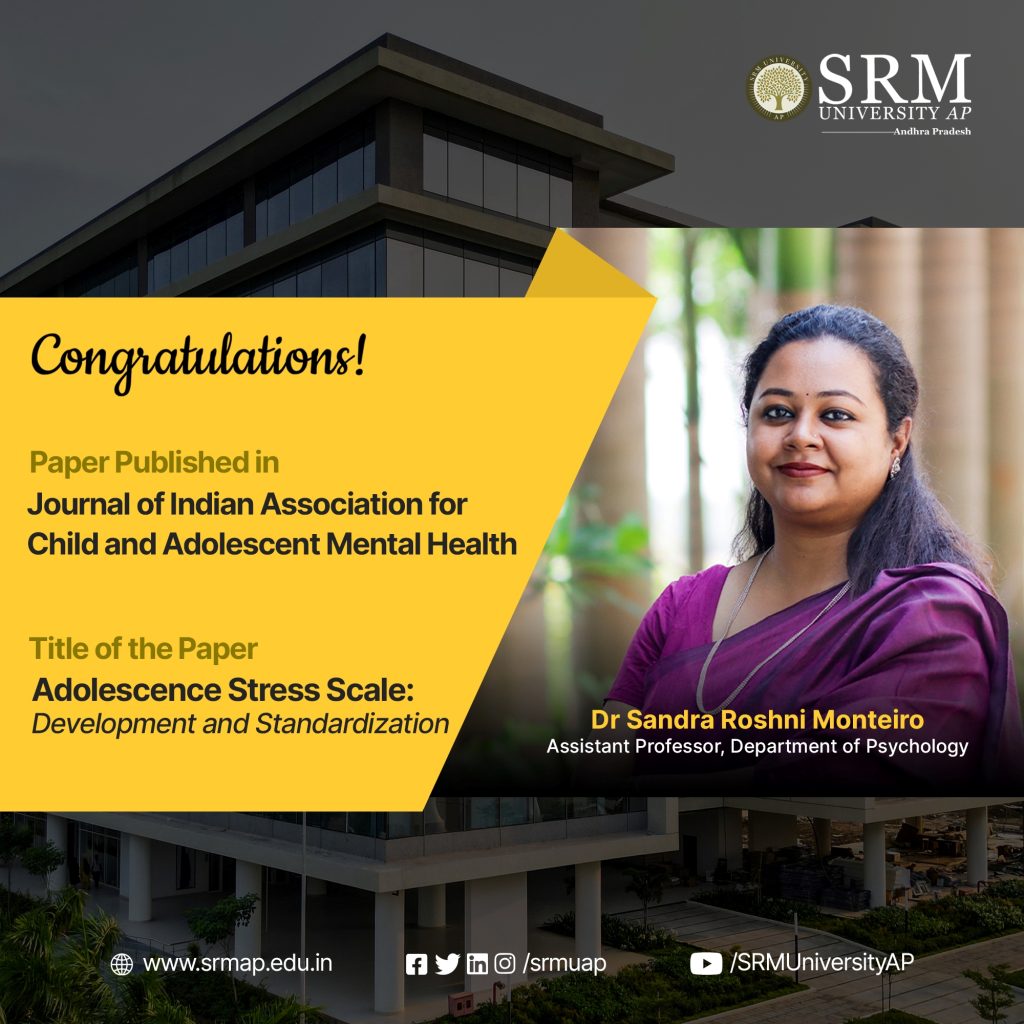
The research paper titled “The Adolescence Stress Scale: Development and Standardization” is a significant contribution to the field of psychology. The paper by Dr Sandra Roshni Monteiro, Assistant Professor at the Department of Psychology in SRM University-AP featured in The Journal of Indian Association for Child and Adolescent Mental Health and provides a detailed account of the development and standardisation of the scale, highlighting its importance and relevance. Dr Monteiro has developed a comprehensive stress scale that aims to evaluate the psychometric issues faced by school-going adolescents.
Here’s a brief extract of the paper.
Abstract
Background/Aim
The objective of the paper was to develop a comprehensive “Adolescence Stress Scale” and to examine different psychometric issues in the development, initial validation, and standardization of this scale.
Method
Exploratory factor analysis was conducted on the data procured from a sample of 634 (11–18 years) school-going adolescents in India.
Results
An exploratory analysis provided a 10-factor structure, namely, major loss-induced stress, enforcement or conflict-induced stress, phobic stress, interpersonal conflict-induced stress, punishment-induced stress, illness and injury-induced stress, performance stress, imposition-induced stress, insecurity-induced stress, and unhealthy environment-induced stress. The 10 oblique factor solutions are found to be interrelated and interdependent with good indices of internal consistency, and content validity.
Conclusions
This scale development is a novel and powerful measure that taps onto various aspects of stress experienced by school-going adolescents. The scale can facilitate researchers, clinicians, and teachers to identify and quantify the significant sources of stress in adolescents in school, or clinic settings.
Continue reading → - Lecture on Marginalised Childhoods December 9, 2023
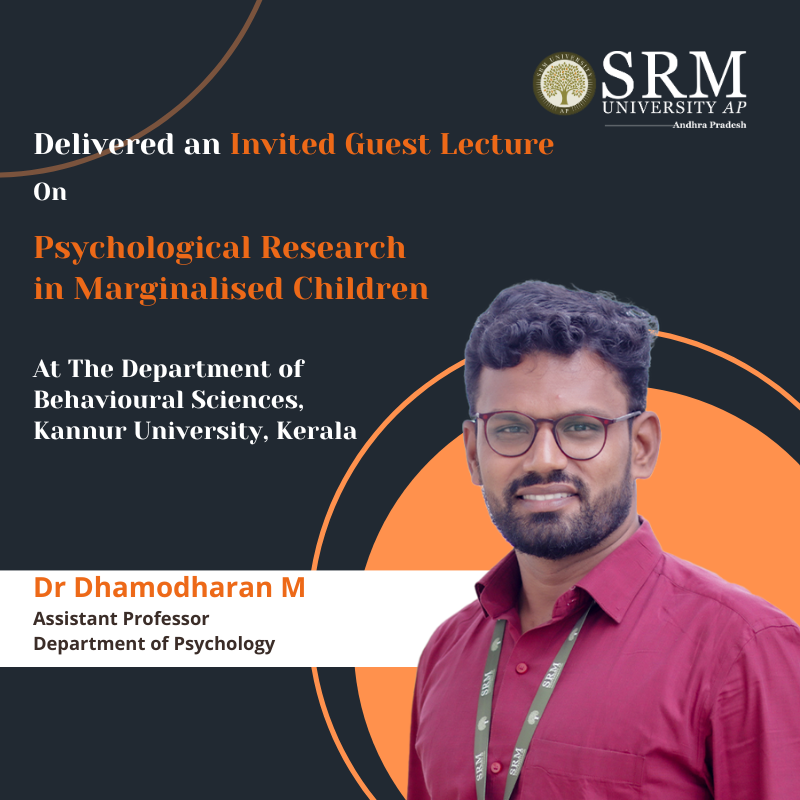
In an insightful talk at the Department of Behavioural Sciences in Kannur University, Dr Dhamodharan M, Assistant Professor at the Department of Psychology, SRM University-AP, shed light on “Psychological Research in Marginalized Children.” Dr Dhamodharan’s talk serves as a call to action, encouraging a deeper exploration of psychological research for the betterment of future generations.
Here’s an abstract of Dr Dhamodharan’s riveting talk.
Abstract
The invited lecture mainly focuses on the status and importance of psychological research in marginalized children. Marginalized People who are excluded from majority social, economic, educational, and/or cultural life. They are excluded due to race, gender identity, sexual orientation, age, physical ability, language, and/or immigration status (Baah et al.,2019). The term marginalized children include Children affected by or emerging from armed conflict or humanitarian crises, Children with disabilities, Children in remote or rural areas (including those who lack access to safe water and sanitation), Religious or ethnic minorities, Orphans, and children affected by HIV/AIDS, Child laborers, Married Children, Victims of trafficking (Legal Information Institute,2023). The World Health Organization defined “Child maltreatment is the abuse and neglect that occurs to children under 18 years of age. It includes all types of physical and emotional ill-treatment, sexual abuse, neglect, negligence, and commercial or other exploitation, which results in actual or potential harm to the child’s health, survival, development, or dignity in the context of a relationship of responsibility, trust or power” (World Health Organization, 2020). Children need essential nutrition, parental care, education, safety, entertainment, medical assistance, and physical, psychological, and social development (Deb & Ray, 2015). Children have their first human contact at home in a pleasant, nurturing, and caring environment; unfortunately, home is also where children are exposed to violence for the first time (United Nations Children’s Fund,2017). All children have the right to be safe from violence, oppression, and abuse. Despite this, globally, millions of children from all socioeconomic backgrounds, religions, cultures, and ages are subjected to violence and abuse daily. Violence against children is typical and endemic, and it is a terrible reality for millions of Indian children.
Over half of the world’s children have been subjected to extreme violence, with South Asia representing 64% of these instances (End Violence against Children | UNICEF India, n.d.) All types of violence against persons under 18 are considered violence against children. In 2019, about 1 billion children under eighteen experienced physical, sexual, or emotional violence or neglect globally (WHO, 2020). In the world, 3 out of 4 children aged 2-4 years were subjected to violent regulation from caregivers daily. Six out of ten children were exposed to physical punishment, one out of every two children aged 2 to 17 experienced some type of violence, and 18% of girl children experienced childhood sexual violence, while 8% of boys experienced the same (UNICEF, 2020; United Nations Children’s Fund, 2017). Victims of child abuse have also been exposed to more than one type of violence (Descartes et al., 2020).
Many countries are not prohibited corporal punishment. One in every two children aged 6 to 17 is subjected to corporal punishment. Around fifteen million girls aged 15 to 19 have been subjected to forced sex from partners, boyfriends, or husbands, with just one percent seeking professional help. Throughout the world, 1 in every three children aged 13 to 15 has experienced bullying at school. Girls face more psychological bullying than boys, whereas boys face more physical bullying than girls (UNICEF, 2020. Sexual assault and exploitation are the most common violence in slum regions. Those in positions of supremacy and authority, such as educators and leaders, are the primary perpetrators. Early pregnancy is also a serious concern among the underprivileged community, which leads to sexual exploitation (Nagasurendran, 2017).
Approximately 70 lakh children in India are not receiving all vaccinations, particularly in slum areas, migrant settlement areas such as fisher villages, construction sites, and inaccessible villages. This data is very high compared to all other countries globally. Proper childhood nutrition is a significant indicator of development and welfare, especially in developing countries. However, previous literature studies failed to focus on the children from the marginalized communities. The students from Psychology background need to explore the marginalized children’s health, education, and mental health. Furthermore, the marginalized children study findings would be an eye-opener for the social welfare department to take need-based welfare measures for marginalized children.
Current Status of Research
- Convenience sampling procedures overrepresent dominant groups (Rad et al., 2018)
- Only 5% of articles in one premier psychology journal predominately sampled ethnic minorities (Thalmayer et al., 2020)
- Less than 2% of psychological studies across three decades of research included sexual minorities as participants (Lee & Crawford, 2021)
Major Challenges faced by Marginalisation Children
- Health Issues – Malnutrition, Lack of healthcare facilities
- Lack of Educational Support
- Abuse and Violence
- Lack of Social Support
- Caste Discrimination
Areas to Study in Marginalization Children
- Discrimination in School and Community (Deb, 2019)
- Resilience and coping mechanisms (Dar,2020)
- Educational motivation and Teacher-student relationships (Martin,2020)
- Traumatic and Post Traumatic Stress (Szota,2023)
- Identity Formation (Yosef,2023)
- Social Support and Media Influence (Kaskazi,2023)
- Faculty Duo Publish a Critical Analysis and Research on Cyberbullying September 26, 2023
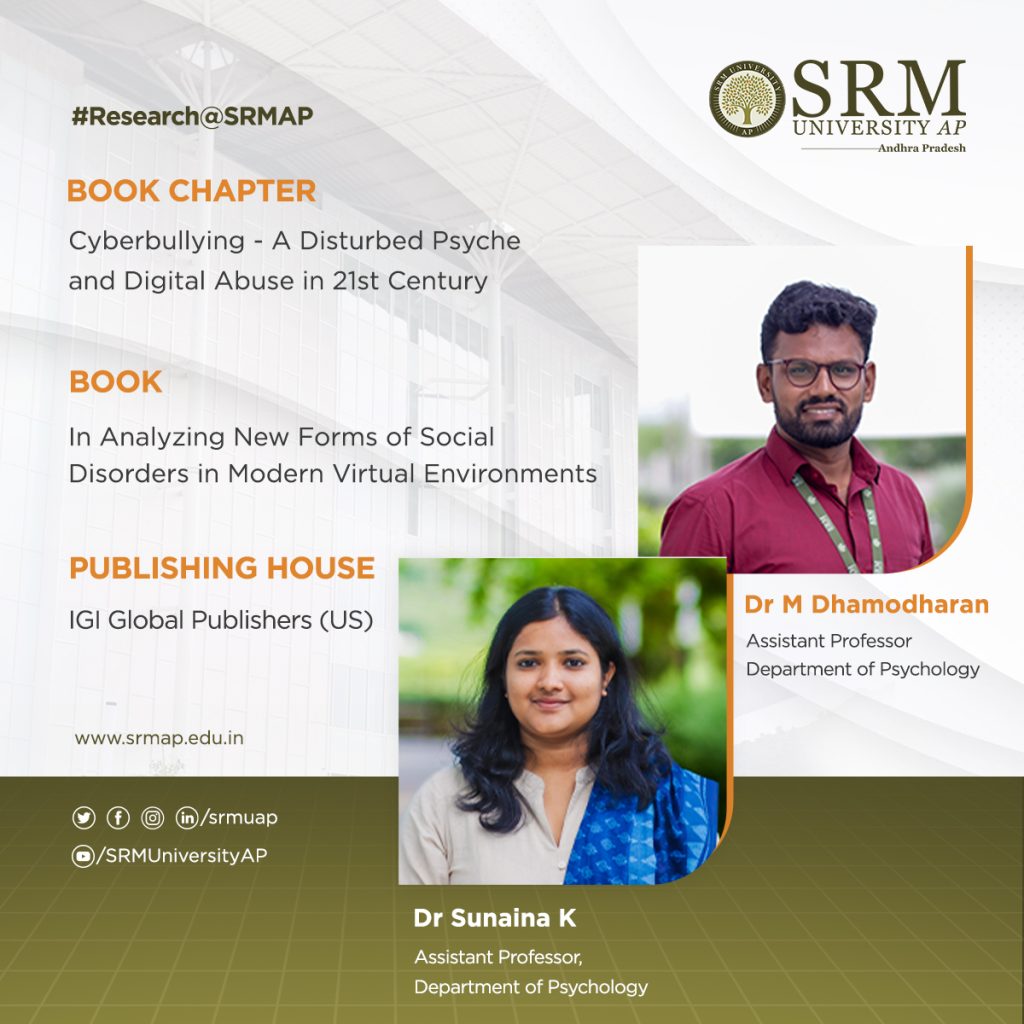
In the digital era, where technology dominates over communication, connection and social relationships, the staggering rise of cyberbullying proves to be detrimental to the social and mental psyche of people. The limited research present regarding the crisis fails to provide sufficient data to critically analyse and initiate policies to combat the same. In this regard, Dr Dhamodharan M and Dr Sunaina K, faculty from the Department of Psychology have conducted insightful research into cyberbullying, the role of technology and the challenges in tackling the act. The faculty duo has published a book chapter titled “Cyberbullying – A Disturbed Psyche and Digital Abuse in 21st Century” in the book In Analyzing New Forms of Social Disorders in Modern Virtual Environments in IGI Global Publishers (US).
Abstract
Cyberbullying is ‘a violent, planned act carried out by a group or specific, using electronic forms of communication, frequently and over time in contradiction of a victim who cannot easily protect him or herself.’ (Smith et al., 2008). According to the UNICEF and Broadband search survey 2023, around 36.5 out of a hundred people feel they were cyberbullied at least once in life, and seventeen percent of people experienced cyberbullying in the last month. 60 out of 100 adolescents experienced cyberbullying. Seventy percent of youths have reported perpetrators. Sixteen percent of women have been stalked at least once in life. 1 in 19 men have been stalked at some point. Fifty percent of LGBTQ people experience cyberbullying. Girls face cyberbullying more than boys. Around 36 percent of girls experience cyberbullying, whereas 24 percent of boys experience cyberbullying. Eighty-three percent of the victims who experienced online bullying also experienced physical bullying. Around 42 percent of the people experience cyberbullying on Instagram, followed by Facebook at 37%, Snapchat at 31%, WhatsApp at 12%, YouTube at 10%, and Twitter at 9%. Cyberbullying refers to using digital technologies such as cyberspace, societal broadcasting platforms, direct messaging, and email to bother, intimidate, or harm others.
This chapter provides an indication of cyberbullying, including its definition, incidence, and impact on individuals and society. Firstly, the chapter reviews the existing research on cyberbullying, exploring its different forms and characteristics and the psychological and social consequences for both victims and perpetrators. Secondly, the role of technology in facilitating and exacerbating cyberbullying is also examined, focusing on the anonymity and distance that online platforms provide. Thirdly, legal and ethical considerations surrounding cyberbullying including the challenges of enforcing laws and policies online are explored. Finally, the chapter highlights the importance of a comprehensive and collaborative approach involving parents, educators, policymakers, and online platforms to address cyberbullying.
Implications
Cyberbullying is a pervasive problem with significant and long-lasting consequences for people, their families, and society. It is essential to address cyberbullying thoroughly and implement effective prevention measures to create a more secure and respectful online environment. Cyberbullying can have detrimental effects on its victims, leading to feelings of helplessness, mental health issues, trouble with schoolwork, and even self-harm or suicide. In addition, cyberbullying affects the social fabric of groups, and trust, and impedes the proper growth of individuals, especially children and adolescents. Cyberbullying has a shocking prevalence worldwide, and it is spreading over to people silently. Traditional bullying differs from cyberbullying; it occurs to the victims in various forms and levels.
Continue reading →

